ECON1056 Price Theory: Pre-Mix Concrete Industry Merger Analysis
VerifiedAdded on 2023/03/23
|13
|1663
|27
Report
AI Summary
This report provides an industry analysis of the pre-mix concrete industry, evaluating the potential consequences of a merger between ConCorp and Big Industries. It examines the industry structure, which is characterized as an oligopoly with significant entry barriers, and compares the industry outcomes before and after the proposed merger. Before the merger, three firms (Aggregate Inc, Big Industries, and ConCrop) operate, each producing 2300 cubic meters of pre-mixed concrete with a profit of $64500. The market price is $255, and the consumer surplus is $1190250. After the merger, the merged firm, Big Con, increases its output to 3400 cubic meters due to lower marginal costs, while Aggregate Inc reduces its output. The aggregate industry output decreases to 6300 cubic meters, and while each firm enjoys a higher profit, the consumer surplus decreases to 992250. The analysis concludes that the industry produces a better outcome without the merger, recommending that the merger between ConCorp and Big Industries should not be approved as it negatively impacts consumer welfare.
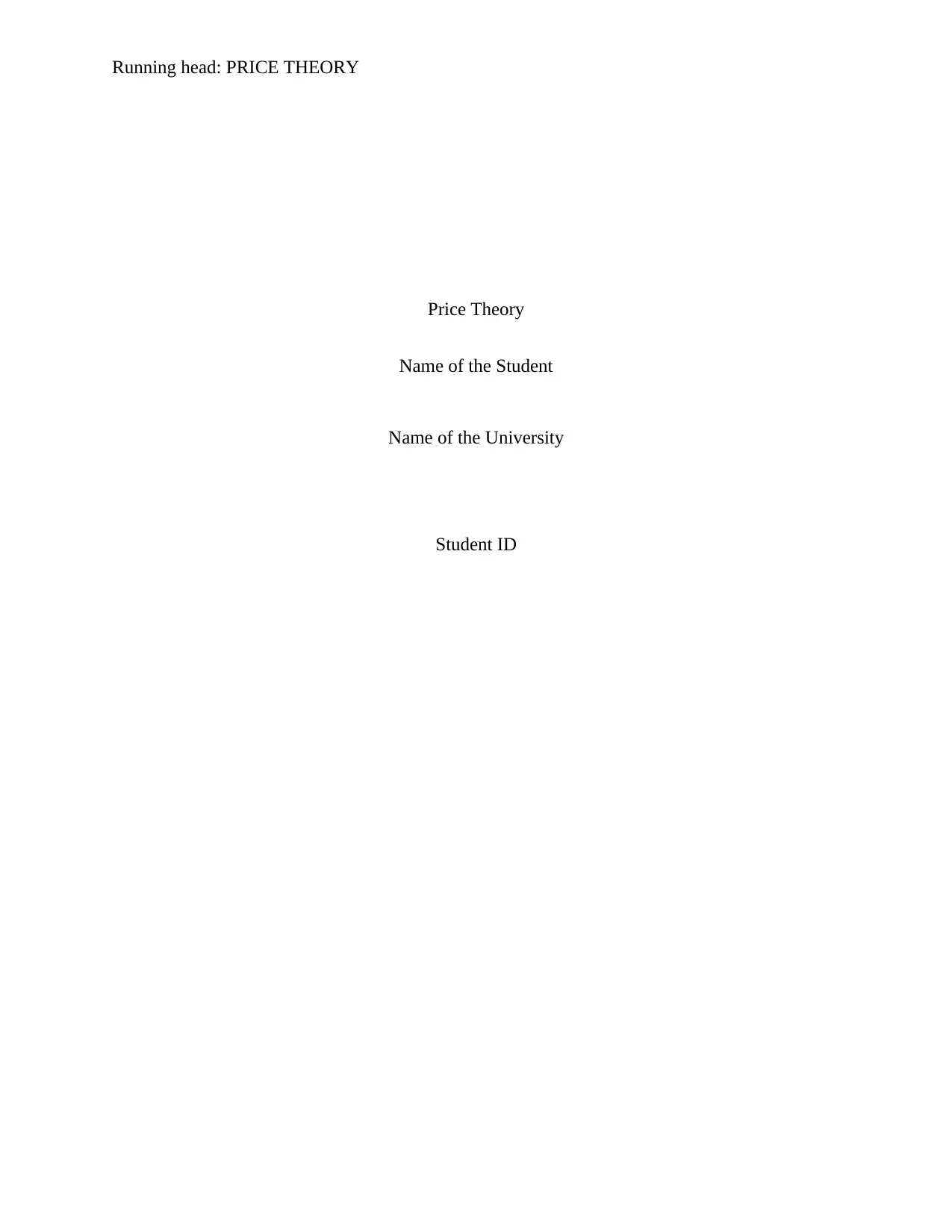
Running head: PRICE THEORY
Price Theory
Name of the Student
Name of the University
Student ID
Price Theory
Name of the Student
Name of the University
Student ID
Paraphrase This Document
Need a fresh take? Get an instant paraphrase of this document with our AI Paraphraser
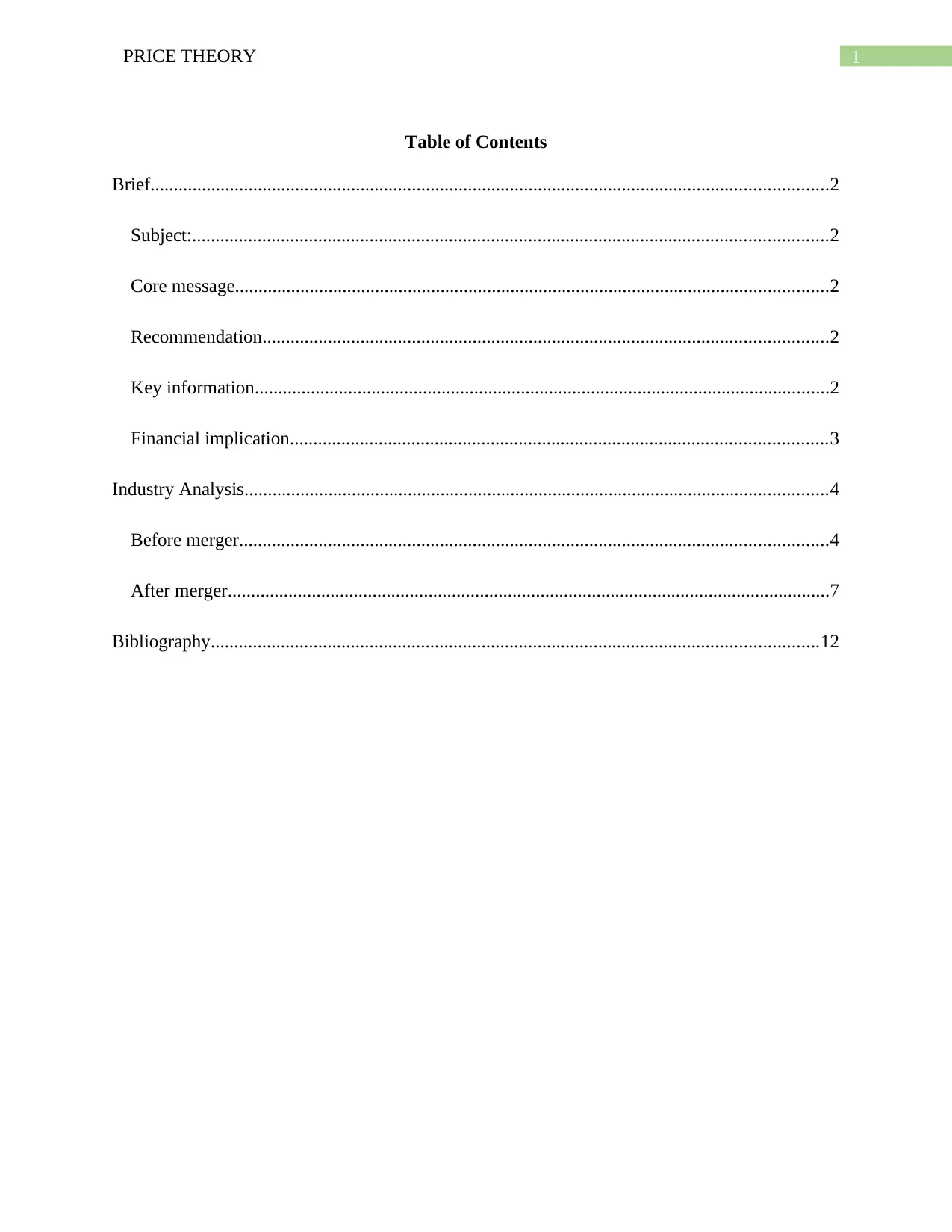
1PRICE THEORY
Table of Contents
Brief.................................................................................................................................................2
Subject:........................................................................................................................................2
Core message...............................................................................................................................2
Recommendation.........................................................................................................................2
Key information...........................................................................................................................2
Financial implication...................................................................................................................3
Industry Analysis.............................................................................................................................4
Before merger..............................................................................................................................4
After merger.................................................................................................................................7
Bibliography..................................................................................................................................12
Table of Contents
Brief.................................................................................................................................................2
Subject:........................................................................................................................................2
Core message...............................................................................................................................2
Recommendation.........................................................................................................................2
Key information...........................................................................................................................2
Financial implication...................................................................................................................3
Industry Analysis.............................................................................................................................4
Before merger..............................................................................................................................4
After merger.................................................................................................................................7
Bibliography..................................................................................................................................12
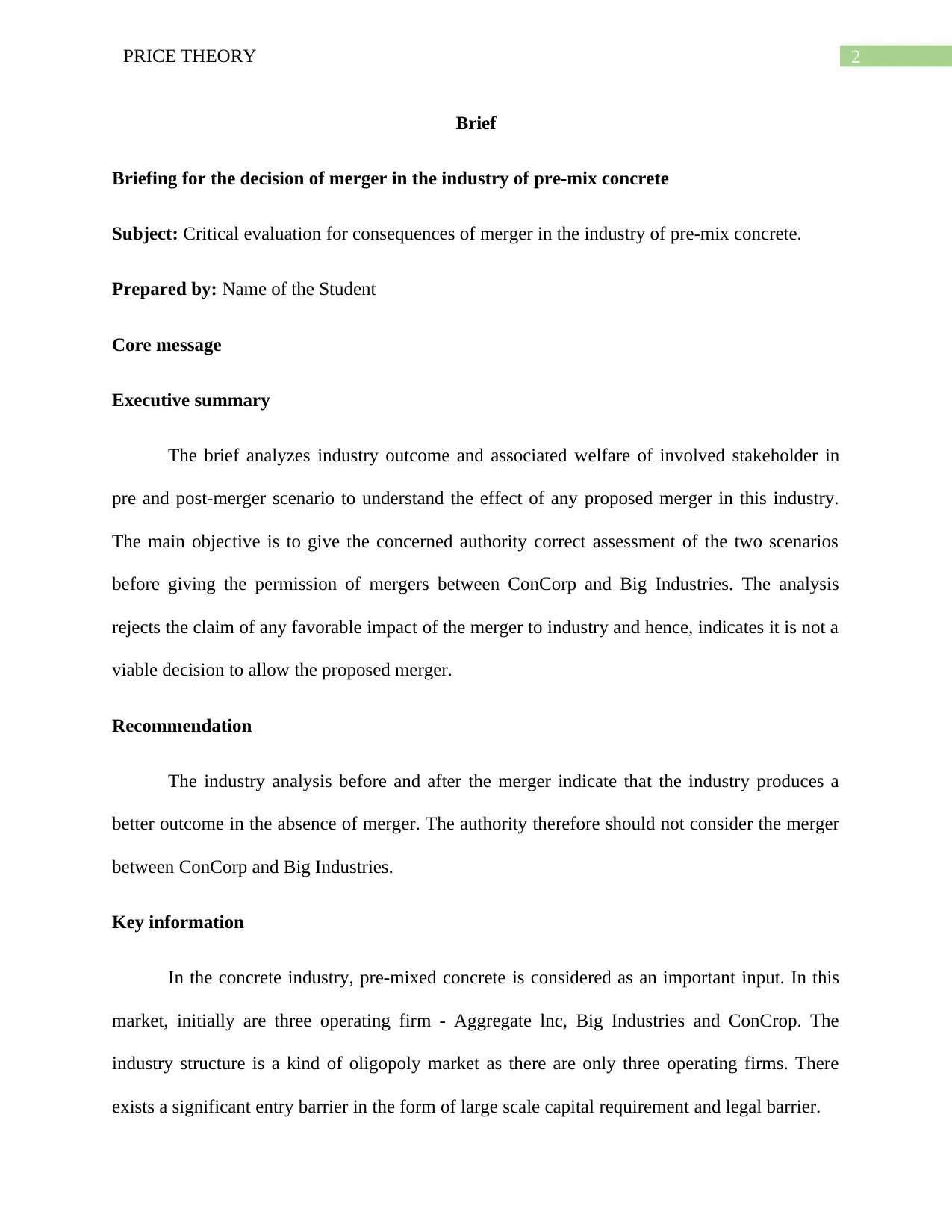
2PRICE THEORY
Brief
Briefing for the decision of merger in the industry of pre-mix concrete
Subject: Critical evaluation for consequences of merger in the industry of pre-mix concrete.
Prepared by: Name of the Student
Core message
Executive summary
The brief analyzes industry outcome and associated welfare of involved stakeholder in
pre and post-merger scenario to understand the effect of any proposed merger in this industry.
The main objective is to give the concerned authority correct assessment of the two scenarios
before giving the permission of mergers between ConCorp and Big Industries. The analysis
rejects the claim of any favorable impact of the merger to industry and hence, indicates it is not a
viable decision to allow the proposed merger.
Recommendation
The industry analysis before and after the merger indicate that the industry produces a
better outcome in the absence of merger. The authority therefore should not consider the merger
between ConCorp and Big Industries.
Key information
In the concrete industry, pre-mixed concrete is considered as an important input. In this
market, initially are three operating firm - Aggregate lnc, Big Industries and ConCrop. The
industry structure is a kind of oligopoly market as there are only three operating firms. There
exists a significant entry barrier in the form of large scale capital requirement and legal barrier.
Brief
Briefing for the decision of merger in the industry of pre-mix concrete
Subject: Critical evaluation for consequences of merger in the industry of pre-mix concrete.
Prepared by: Name of the Student
Core message
Executive summary
The brief analyzes industry outcome and associated welfare of involved stakeholder in
pre and post-merger scenario to understand the effect of any proposed merger in this industry.
The main objective is to give the concerned authority correct assessment of the two scenarios
before giving the permission of mergers between ConCorp and Big Industries. The analysis
rejects the claim of any favorable impact of the merger to industry and hence, indicates it is not a
viable decision to allow the proposed merger.
Recommendation
The industry analysis before and after the merger indicate that the industry produces a
better outcome in the absence of merger. The authority therefore should not consider the merger
between ConCorp and Big Industries.
Key information
In the concrete industry, pre-mixed concrete is considered as an important input. In this
market, initially are three operating firm - Aggregate lnc, Big Industries and ConCrop. The
industry structure is a kind of oligopoly market as there are only three operating firms. There
exists a significant entry barrier in the form of large scale capital requirement and legal barrier.
⊘ This is a preview!⊘
Do you want full access?
Subscribe today to unlock all pages.

Trusted by 1+ million students worldwide
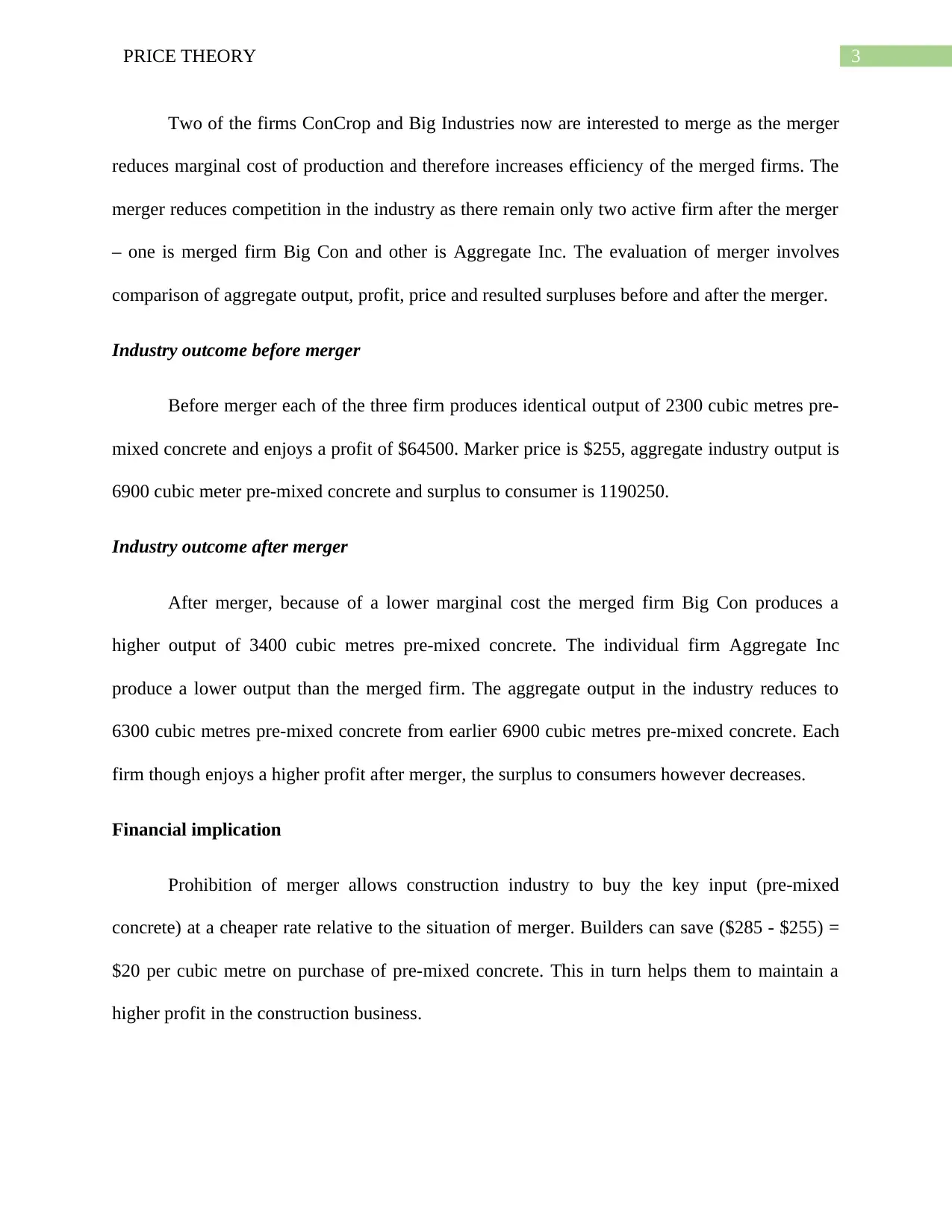
3PRICE THEORY
Two of the firms ConCrop and Big Industries now are interested to merge as the merger
reduces marginal cost of production and therefore increases efficiency of the merged firms. The
merger reduces competition in the industry as there remain only two active firm after the merger
– one is merged firm Big Con and other is Aggregate Inc. The evaluation of merger involves
comparison of aggregate output, profit, price and resulted surpluses before and after the merger.
Industry outcome before merger
Before merger each of the three firm produces identical output of 2300 cubic metres pre-
mixed concrete and enjoys a profit of $64500. Marker price is $255, aggregate industry output is
6900 cubic meter pre-mixed concrete and surplus to consumer is 1190250.
Industry outcome after merger
After merger, because of a lower marginal cost the merged firm Big Con produces a
higher output of 3400 cubic metres pre-mixed concrete. The individual firm Aggregate Inc
produce a lower output than the merged firm. The aggregate output in the industry reduces to
6300 cubic metres pre-mixed concrete from earlier 6900 cubic metres pre-mixed concrete. Each
firm though enjoys a higher profit after merger, the surplus to consumers however decreases.
Financial implication
Prohibition of merger allows construction industry to buy the key input (pre-mixed
concrete) at a cheaper rate relative to the situation of merger. Builders can save ($285 - $255) =
$20 per cubic metre on purchase of pre-mixed concrete. This in turn helps them to maintain a
higher profit in the construction business.
Two of the firms ConCrop and Big Industries now are interested to merge as the merger
reduces marginal cost of production and therefore increases efficiency of the merged firms. The
merger reduces competition in the industry as there remain only two active firm after the merger
– one is merged firm Big Con and other is Aggregate Inc. The evaluation of merger involves
comparison of aggregate output, profit, price and resulted surpluses before and after the merger.
Industry outcome before merger
Before merger each of the three firm produces identical output of 2300 cubic metres pre-
mixed concrete and enjoys a profit of $64500. Marker price is $255, aggregate industry output is
6900 cubic meter pre-mixed concrete and surplus to consumer is 1190250.
Industry outcome after merger
After merger, because of a lower marginal cost the merged firm Big Con produces a
higher output of 3400 cubic metres pre-mixed concrete. The individual firm Aggregate Inc
produce a lower output than the merged firm. The aggregate output in the industry reduces to
6300 cubic metres pre-mixed concrete from earlier 6900 cubic metres pre-mixed concrete. Each
firm though enjoys a higher profit after merger, the surplus to consumers however decreases.
Financial implication
Prohibition of merger allows construction industry to buy the key input (pre-mixed
concrete) at a cheaper rate relative to the situation of merger. Builders can save ($285 - $255) =
$20 per cubic metre on purchase of pre-mixed concrete. This in turn helps them to maintain a
higher profit in the construction business.
Paraphrase This Document
Need a fresh take? Get an instant paraphrase of this document with our AI Paraphraser
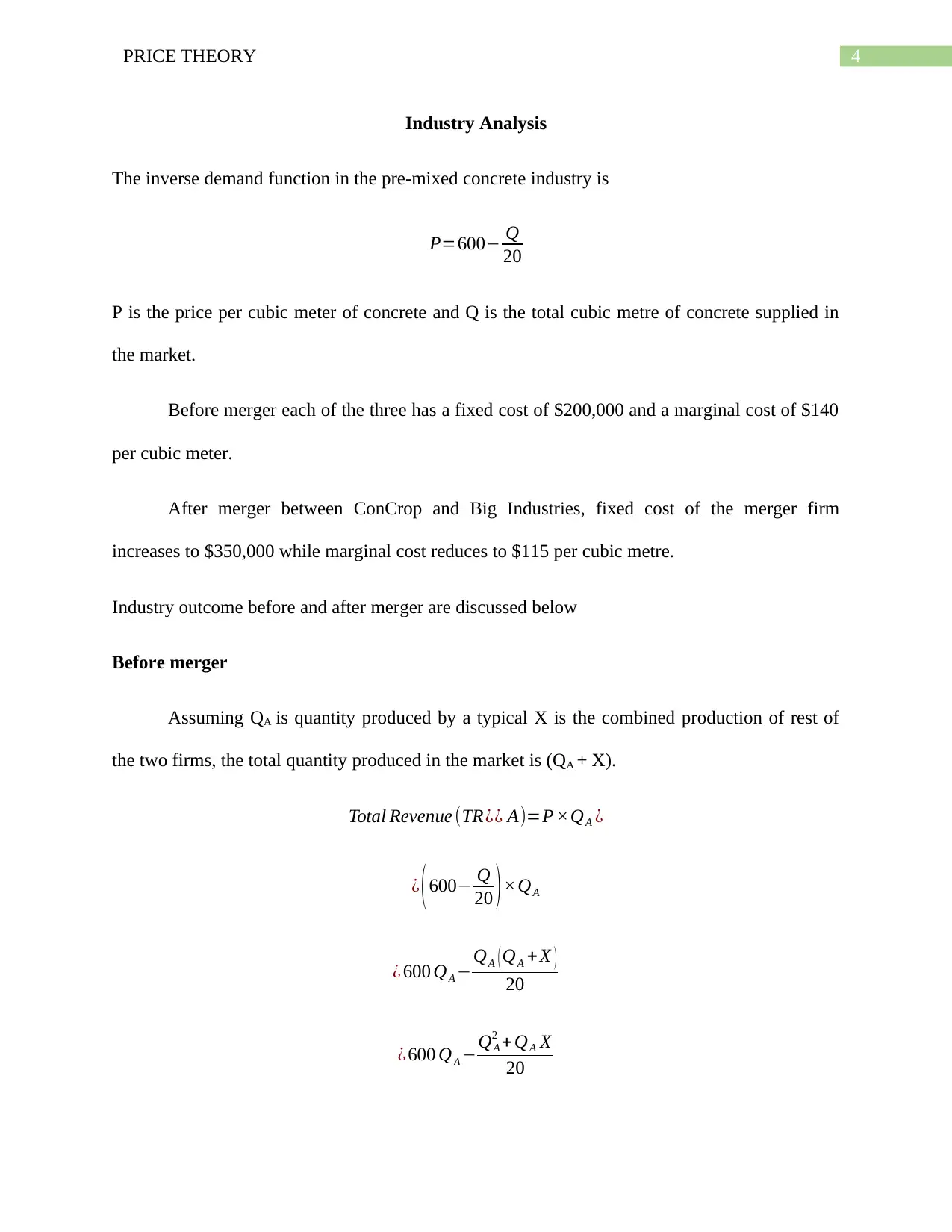
4PRICE THEORY
Industry Analysis
The inverse demand function in the pre-mixed concrete industry is
P=600− Q
20
P is the price per cubic meter of concrete and Q is the total cubic metre of concrete supplied in
the market.
Before merger each of the three has a fixed cost of $200,000 and a marginal cost of $140
per cubic meter.
After merger between ConCrop and Big Industries, fixed cost of the merger firm
increases to $350,000 while marginal cost reduces to $115 per cubic metre.
Industry outcome before and after merger are discussed below
Before merger
Assuming QA is quantity produced by a typical X is the combined production of rest of
the two firms, the total quantity produced in the market is (QA + X).
Total Revenue (TR¿¿ A)=P ×QA ¿
¿ (600− Q
20 )×QA
¿ 600 QA −QA ( QA +X )
20
¿ 600 QA −QA
2 +QA X
20
Industry Analysis
The inverse demand function in the pre-mixed concrete industry is
P=600− Q
20
P is the price per cubic meter of concrete and Q is the total cubic metre of concrete supplied in
the market.
Before merger each of the three has a fixed cost of $200,000 and a marginal cost of $140
per cubic meter.
After merger between ConCrop and Big Industries, fixed cost of the merger firm
increases to $350,000 while marginal cost reduces to $115 per cubic metre.
Industry outcome before and after merger are discussed below
Before merger
Assuming QA is quantity produced by a typical X is the combined production of rest of
the two firms, the total quantity produced in the market is (QA + X).
Total Revenue (TR¿¿ A)=P ×QA ¿
¿ (600− Q
20 )×QA
¿ 600 QA −QA ( QA +X )
20
¿ 600 QA −QA
2 +QA X
20
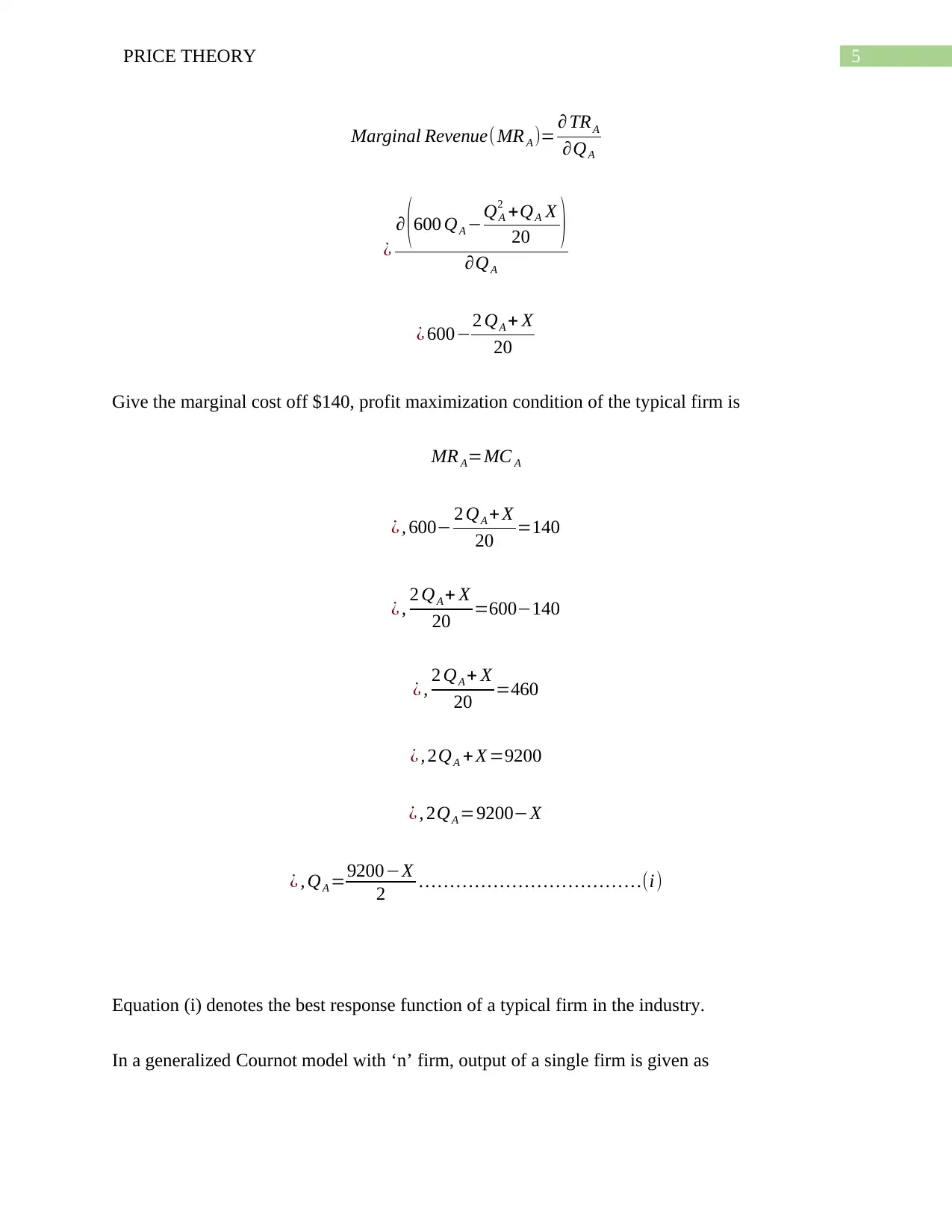
5PRICE THEORY
Marginal Revenue(MR A )= ∂ TRA
∂QA
¿
∂ ( 600 QA −QA
2 +QA X
20 )
∂QA
¿ 600−2 QA + X
20
Give the marginal cost off $140, profit maximization condition of the typical firm is
MR A=MC A
¿ , 600− 2 QA + X
20 =140
¿ , 2 QA + X
20 =600−140
¿ , 2 QA + X
20 =460
¿ , 2QA + X =9200
¿ , 2QA =9200−X
¿ , QA =9200−X
2 … … … … … … … … …… … …(i)
Equation (i) denotes the best response function of a typical firm in the industry.
In a generalized Cournot model with ‘n’ firm, output of a single firm is given as
Marginal Revenue(MR A )= ∂ TRA
∂QA
¿
∂ ( 600 QA −QA
2 +QA X
20 )
∂QA
¿ 600−2 QA + X
20
Give the marginal cost off $140, profit maximization condition of the typical firm is
MR A=MC A
¿ , 600− 2 QA + X
20 =140
¿ , 2 QA + X
20 =600−140
¿ , 2 QA + X
20 =460
¿ , 2QA + X =9200
¿ , 2QA =9200−X
¿ , QA =9200−X
2 … … … … … … … … …… … …(i)
Equation (i) denotes the best response function of a typical firm in the industry.
In a generalized Cournot model with ‘n’ firm, output of a single firm is given as
⊘ This is a preview!⊘
Do you want full access?
Subscribe today to unlock all pages.

Trusted by 1+ million students worldwide
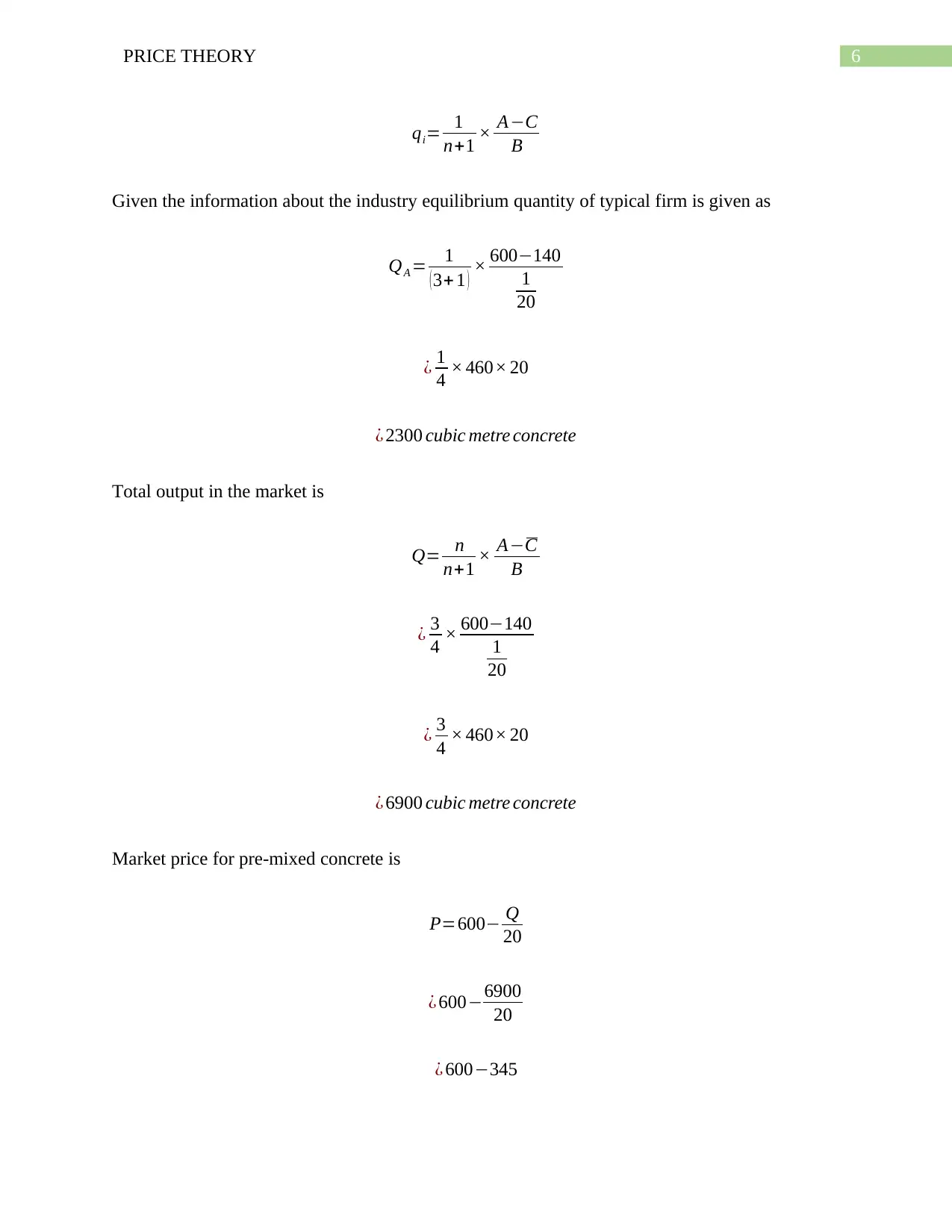
6PRICE THEORY
qi= 1
n+1 × A−C
B
Given the information about the industry equilibrium quantity of typical firm is given as
QA = 1
( 3+ 1 ) × 600−140
1
20
¿ 1
4 × 460× 20
¿ 2300 cubic metre concrete
Total output in the market is
Q= n
n+1 × A−C
B
¿ 3
4 × 600−140
1
20
¿ 3
4 × 460× 20
¿ 6900 cubic metre concrete
Market price for pre-mixed concrete is
P=600− Q
20
¿ 600−6900
20
¿ 600−345
qi= 1
n+1 × A−C
B
Given the information about the industry equilibrium quantity of typical firm is given as
QA = 1
( 3+ 1 ) × 600−140
1
20
¿ 1
4 × 460× 20
¿ 2300 cubic metre concrete
Total output in the market is
Q= n
n+1 × A−C
B
¿ 3
4 × 600−140
1
20
¿ 3
4 × 460× 20
¿ 6900 cubic metre concrete
Market price for pre-mixed concrete is
P=600− Q
20
¿ 600−6900
20
¿ 600−345
Paraphrase This Document
Need a fresh take? Get an instant paraphrase of this document with our AI Paraphraser
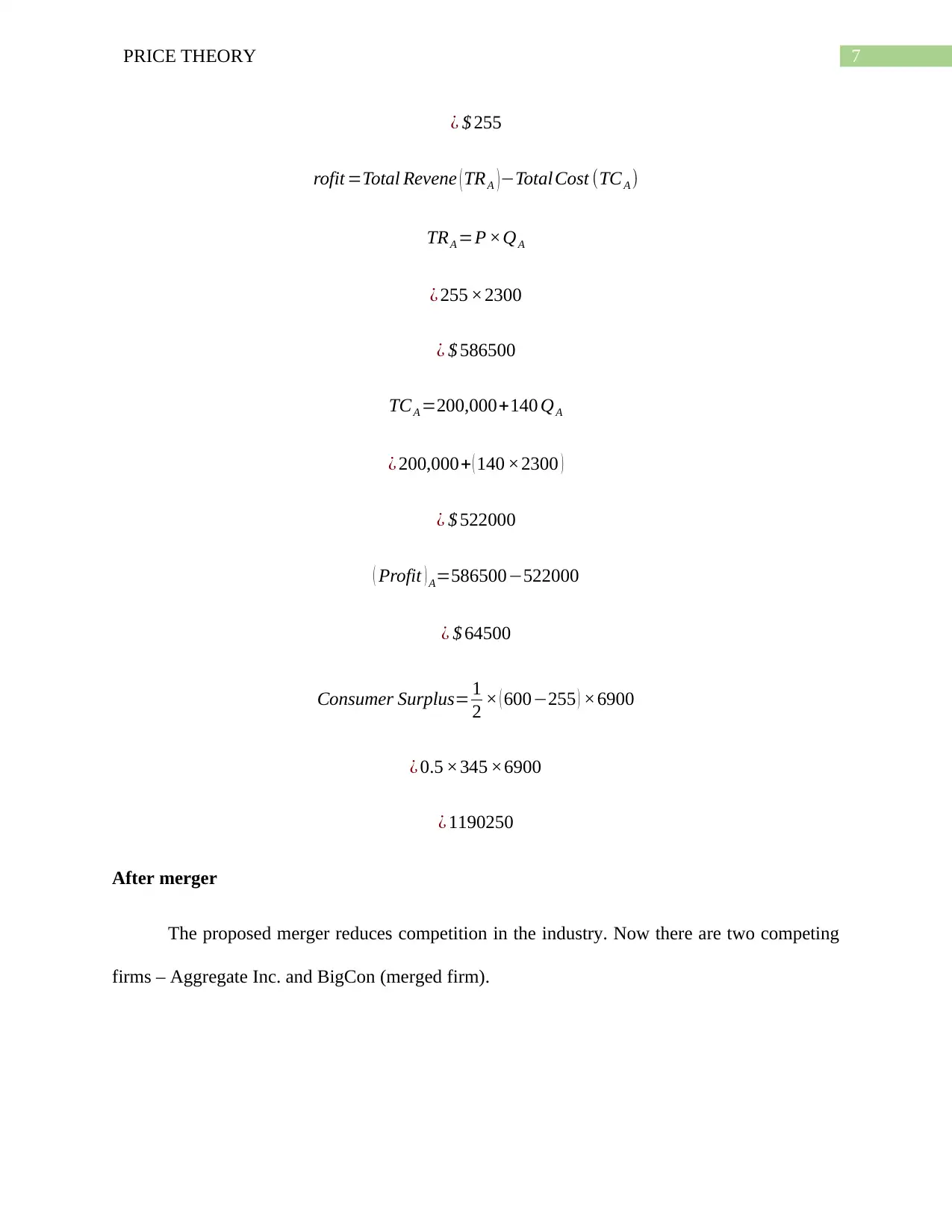
7PRICE THEORY
¿ $ 255
rofit =Total Revene ( TRA )−Total Cost (TCA )
TRA =P ×QA
¿ 255 ×2300
¿ $ 586500
TCA =200,000+140 QA
¿ 200,000+ ( 140 ×2300 )
¿ $ 522000
( Profit ) A=586500−522000
¿ $ 64500
Consumer Surplus= 1
2 × ( 600−255 ) ×6900
¿ 0.5 ×345 ×6900
¿ 1190250
After merger
The proposed merger reduces competition in the industry. Now there are two competing
firms – Aggregate Inc. and BigCon (merged firm).
¿ $ 255
rofit =Total Revene ( TRA )−Total Cost (TCA )
TRA =P ×QA
¿ 255 ×2300
¿ $ 586500
TCA =200,000+140 QA
¿ 200,000+ ( 140 ×2300 )
¿ $ 522000
( Profit ) A=586500−522000
¿ $ 64500
Consumer Surplus= 1
2 × ( 600−255 ) ×6900
¿ 0.5 ×345 ×6900
¿ 1190250
After merger
The proposed merger reduces competition in the industry. Now there are two competing
firms – Aggregate Inc. and BigCon (merged firm).
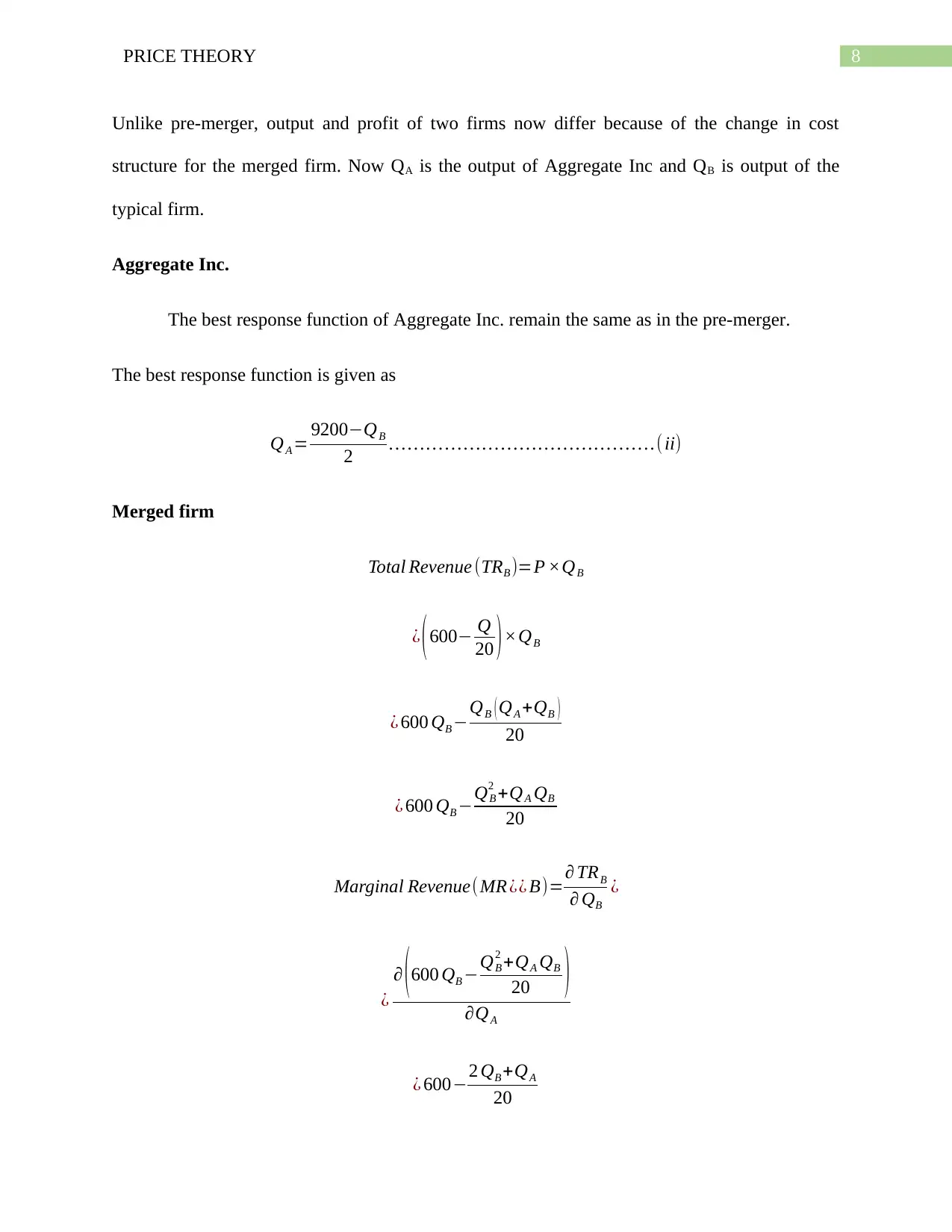
8PRICE THEORY
Unlike pre-merger, output and profit of two firms now differ because of the change in cost
structure for the merged firm. Now QA is the output of Aggregate Inc and QB is output of the
typical firm.
Aggregate Inc.
The best response function of Aggregate Inc. remain the same as in the pre-merger.
The best response function is given as
QA = 9200−QB
2 … … … … … … … … … … … … … … .(ii)
Merged firm
Total Revenue (TRB )=P ×QB
¿ (600− Q
20 )×QB
¿ 600 QB −QB ( QA +QB )
20
¿ 600 QB −QB
2 +QA QB
20
Marginal Revenue(MR ¿¿ B)=∂ TRB
∂ QB
¿
¿
∂ (600 QB −QB
2 +QA QB
20 )
∂QA
¿ 600−2 QB +QA
20
Unlike pre-merger, output and profit of two firms now differ because of the change in cost
structure for the merged firm. Now QA is the output of Aggregate Inc and QB is output of the
typical firm.
Aggregate Inc.
The best response function of Aggregate Inc. remain the same as in the pre-merger.
The best response function is given as
QA = 9200−QB
2 … … … … … … … … … … … … … … .(ii)
Merged firm
Total Revenue (TRB )=P ×QB
¿ (600− Q
20 )×QB
¿ 600 QB −QB ( QA +QB )
20
¿ 600 QB −QB
2 +QA QB
20
Marginal Revenue(MR ¿¿ B)=∂ TRB
∂ QB
¿
¿
∂ (600 QB −QB
2 +QA QB
20 )
∂QA
¿ 600−2 QB +QA
20
⊘ This is a preview!⊘
Do you want full access?
Subscribe today to unlock all pages.

Trusted by 1+ million students worldwide
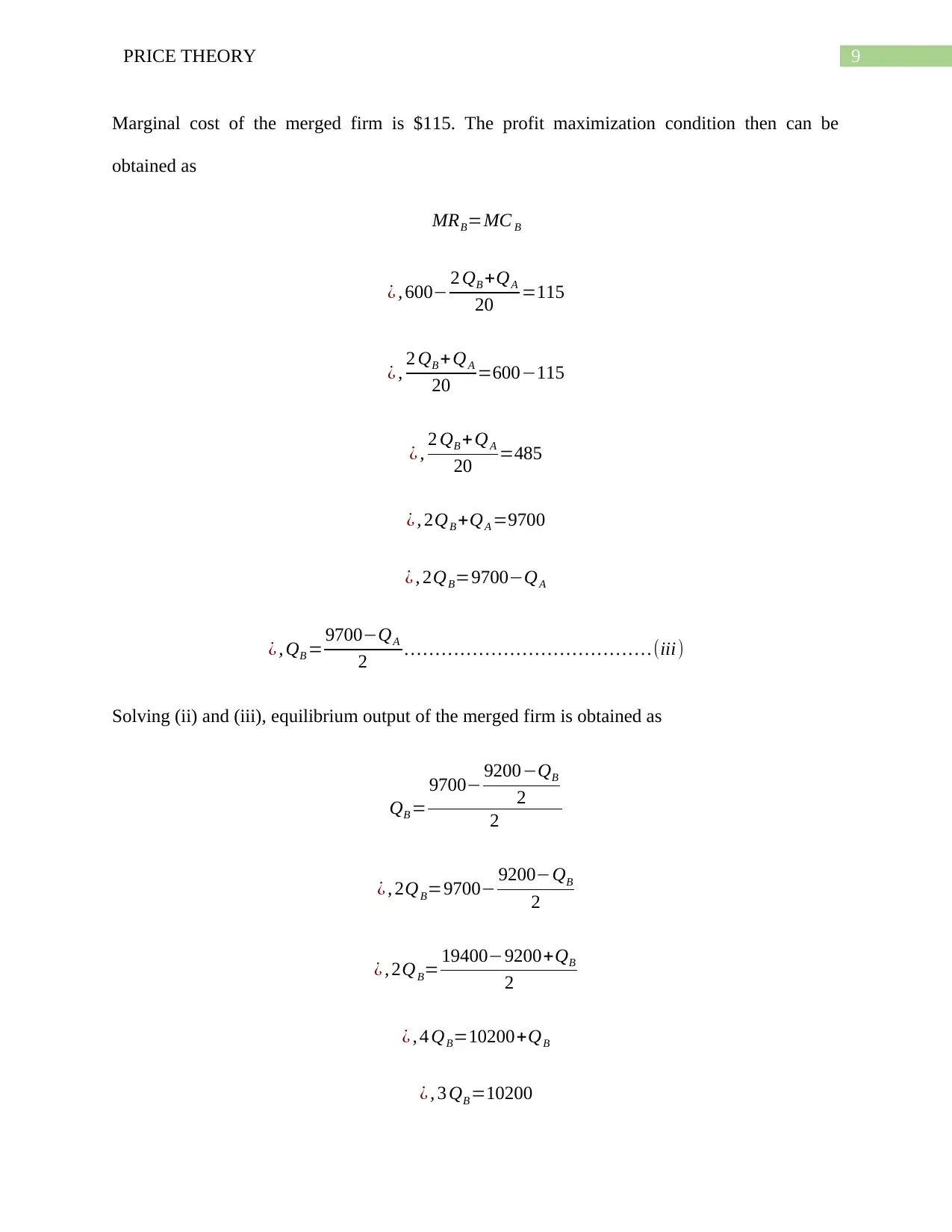
9PRICE THEORY
Marginal cost of the merged firm is $115. The profit maximization condition then can be
obtained as
MRB=MC B
¿ , 600− 2 QB +QA
20 =115
¿ , 2 QB +QA
20 =600−115
¿ , 2 QB +QA
20 =485
¿ , 2QB +QA =9700
¿ , 2QB=9700−QA
¿ , QB = 9700−QA
2 … … … … … … … … … … … … … .(iii )
Solving (ii) and (iii), equilibrium output of the merged firm is obtained as
QB =
9700− 9200−QB
2
2
¿ , 2QB=9700− 9200−QB
2
¿ , 2QB= 19400−9200+QB
2
¿ , 4 QB=10200+QB
¿ , 3 QB =10200
Marginal cost of the merged firm is $115. The profit maximization condition then can be
obtained as
MRB=MC B
¿ , 600− 2 QB +QA
20 =115
¿ , 2 QB +QA
20 =600−115
¿ , 2 QB +QA
20 =485
¿ , 2QB +QA =9700
¿ , 2QB=9700−QA
¿ , QB = 9700−QA
2 … … … … … … … … … … … … … .(iii )
Solving (ii) and (iii), equilibrium output of the merged firm is obtained as
QB =
9700− 9200−QB
2
2
¿ , 2QB=9700− 9200−QB
2
¿ , 2QB= 19400−9200+QB
2
¿ , 4 QB=10200+QB
¿ , 3 QB =10200
Paraphrase This Document
Need a fresh take? Get an instant paraphrase of this document with our AI Paraphraser
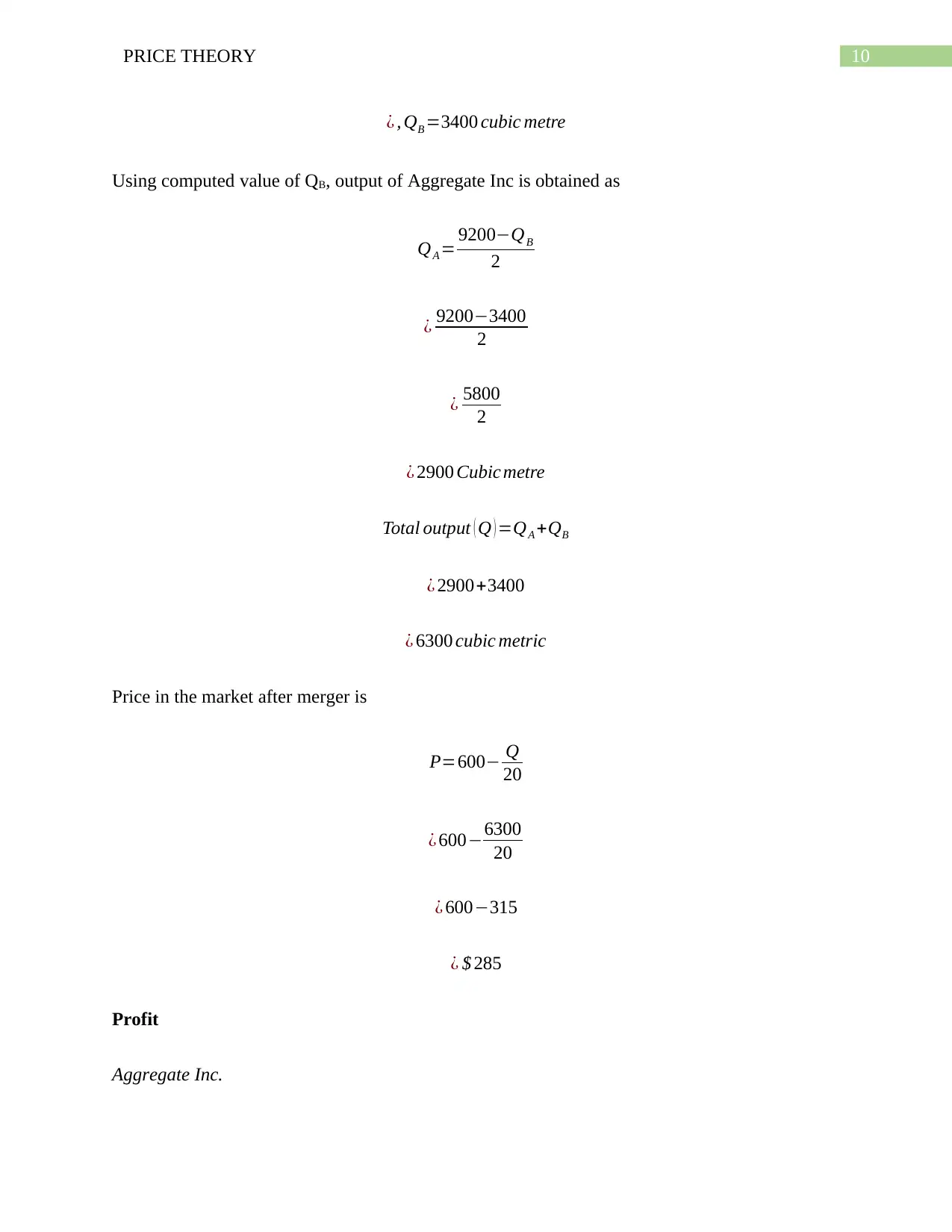
10PRICE THEORY
¿ , QB =3400 cubic metre
Using computed value of QB, output of Aggregate Inc is obtained as
QA = 9200−QB
2
¿ 9200−3400
2
¿ 5800
2
¿ 2900 Cubic metre
Total output ( Q ) =QA +QB
¿ 2900+3400
¿ 6300 cubic metric
Price in the market after merger is
P=600− Q
20
¿ 600−6300
20
¿ 600−315
¿ $ 285
Profit
Aggregate Inc.
¿ , QB =3400 cubic metre
Using computed value of QB, output of Aggregate Inc is obtained as
QA = 9200−QB
2
¿ 9200−3400
2
¿ 5800
2
¿ 2900 Cubic metre
Total output ( Q ) =QA +QB
¿ 2900+3400
¿ 6300 cubic metric
Price in the market after merger is
P=600− Q
20
¿ 600−6300
20
¿ 600−315
¿ $ 285
Profit
Aggregate Inc.
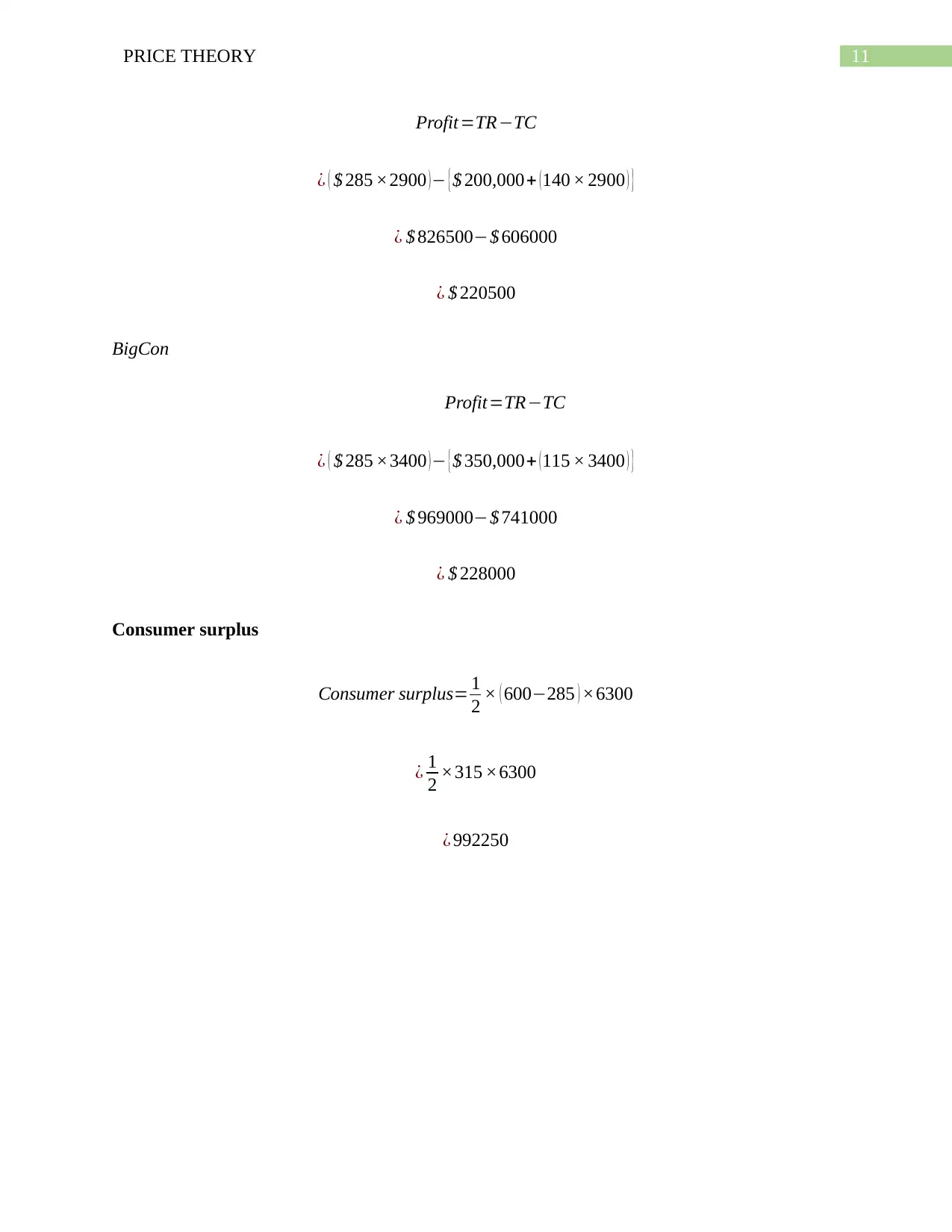
11PRICE THEORY
Profit=TR−TC
¿ ( $ 285 ×2900 ) − { $ 200,000+ ( 140 × 2900 ) }
¿ $ 826500−$ 606000
¿ $ 220500
BigCon
Profit=TR−TC
¿ ( $ 285 ×3400 ) − { $ 350,000+ ( 115 × 3400 ) }
¿ $ 969000−$ 741000
¿ $ 228000
Consumer surplus
Consumer surplus= 1
2 × ( 600−285 ) ×6300
¿ 1
2 ×315 ×6300
¿ 992250
Profit=TR−TC
¿ ( $ 285 ×2900 ) − { $ 200,000+ ( 140 × 2900 ) }
¿ $ 826500−$ 606000
¿ $ 220500
BigCon
Profit=TR−TC
¿ ( $ 285 ×3400 ) − { $ 350,000+ ( 115 × 3400 ) }
¿ $ 969000−$ 741000
¿ $ 228000
Consumer surplus
Consumer surplus= 1
2 × ( 600−285 ) ×6300
¿ 1
2 ×315 ×6300
¿ 992250
⊘ This is a preview!⊘
Do you want full access?
Subscribe today to unlock all pages.

Trusted by 1+ million students worldwide
1 out of 13
Your All-in-One AI-Powered Toolkit for Academic Success.
+13062052269
info@desklib.com
Available 24*7 on WhatsApp / Email
![[object Object]](/_next/static/media/star-bottom.7253800d.svg)
Unlock your academic potential
Copyright © 2020–2026 A2Z Services. All Rights Reserved. Developed and managed by ZUCOL.


